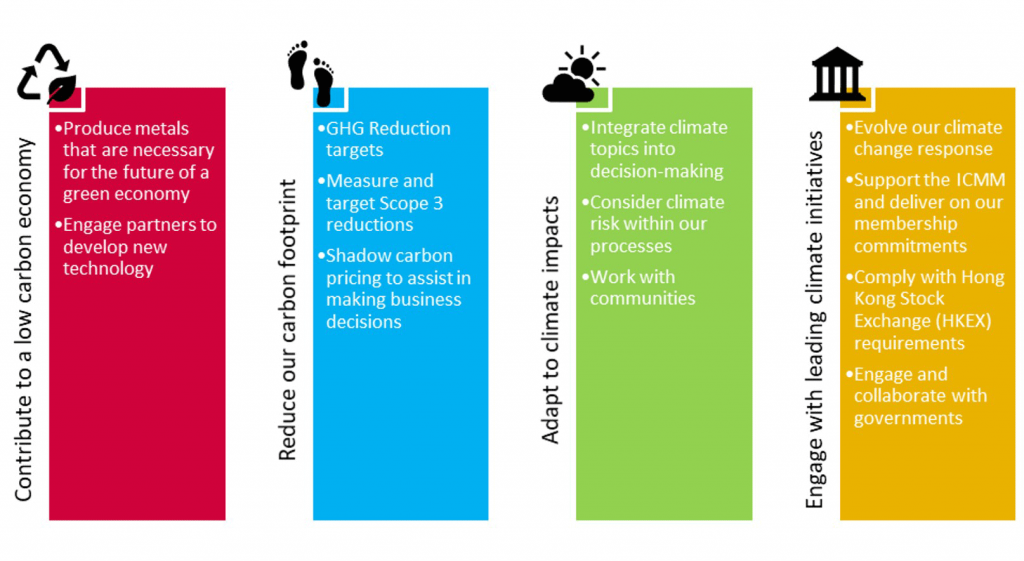Climate Strategy
At MMG we recognise the impact a changing climate could have on our communities, the regions in which we operate, our operations and our supply chains.
Climate change is driving profound changes to businesses, including in the mining sector. More frequent and serious climate-related events are causing impacts on operations, supply chains, workforce, host communities and customers. Policy, regulatory changes and investor demands also play an important role in corporations’ climate change response.
In response to this important issue, in 2022, MMG released its Climate Resilience and Decarbonisation Strategy (Climate Strategy). Developed in close collaboration with our operations, we are focused on reducing our greenhouse gas (GHG) emissions, improving operational efficiency and building climate resilience. MMG supports the global energy transition to a low carbon economy. Our Climate Strategy is based on four main pillars:
Climate Strategy Pillars

Targets
We are committed to reducing our emissions because we recognise the impacts of human-induced climate change on our environment, economy and communities. MMG will publicly and transparently address this issue by aiming at specific emission reduction targets:
- Achieve net zero emissions by 2050 (Scope 1 and 2).
- Reducing direct and indirect (Scope 1 and 2) emissions by 40% by 2030, based on 2020 levels.
- Reducing our value chain emissions by working with suppliers/customers.
These targets are science-based and aligned with a 1.5°C pathway, consistent with the Science Based Targets initiative (SBTi).
Measurement and Assurance
In order to calculate our yearly emissions, we depend on measuring the activities that can be considered relevant emitters of greenhouse gases (GHG). The release of GHG into the atmosphere is dependent on the type of activity. That is why the first step to estimating our emissions is having confidence that we are capturing the correct consumption of each fuel or material at the source.
The consumption values (such as litres of diesel used or kilowatt hours of energy consumed) are multiplied by emission factors (EF), resulting in tons of ‘CO2 equivalent’ emissions. GHG Inventories account for the yearly emissions of the company and are a powerful tool to evaluate where our most significant sources of emissions are allocated and help us prioritise our decarbonisation efforts.
GHG measurements guide corporate strategies to reduce, manage emissions and track progress. For the Australian operations, we are legally obliged to report on Scope 1 and Scope 2 emissions under the National Greenhouse and Energy Reporting (NGER).
MMG utilises the environmental database ENVIZI to calculate GHG emissions for all assets.
Our Emissions Profile
MMG`s operations, like any other industry, emits Greenhouse gases. MMG’s GHG emissions are categorised as:
- Scope 1: Direct emissions from fuel combustion and onsite energy generation
- Scope 2: Indirect emissions from purchased electricity (location-based and market-based)
- Scope 3: Indirect emissions from our value chain, including:
-
- Purchased goods and services
- Capital goods
- Transportation and distribution
- Waste generation
- Processing of sold products
In 2024, MMG reported:
- 0.9 million tonnes CO₂e in Scope 1 and 2 emissions
- 2.9 million tonnes CO₂e in Scope 3 emissions
These figures are published in our Sustainability Report and ESG Databook.
Our GHG emissions, as well as our emissions intensity are published in the Annual Reports and Sustainability reports.
Climate Risk and Scenario Analysis
MMG has embedded climate risk and scenario analysis into its broader sustainability and business strategy frameworks, aligning with global standards such as TCFD and IFRS S2.
Decarbonisation Initiatives
We are progressing a range of initiatives to reduce emissions:
- Electrification of mining fleets at Las Bambas and Rosebery
- Renewable energy procurement in Las Bambas, Rosebery, Dugald River and Kinsevere
- Energy efficiency upgrades across processing plants
We are also constantly improving the quality of our emissions data, with a dedicated project in 2025 to work with our Supply Chain and Enterprise Technology teams on improving Scope 3 emissions data.
Governance and Oversight
Climate-related risks and opportunities are overseen by the Governance, Remuneration, Nomination and Sustainability (GRNS) Committee of the Board. The Executive Committee is responsible for implementing our Climate Resilience and Decarbonisation Strategy, with performance tracked through quarterly reviews and integrated into executive scorecards.
Stakeholder Engagement and Transparency
MMG engages with investors, regulators, communities, and industry peers on climate issues. We disclose our climate strategy, performance, and risks through:
- Annual Sustainability Reports
- Sustainability Reports
- ESG Databook’s which includes: TCFD-aligned disclosures and ICMM Socio-Economic Reporting Framework